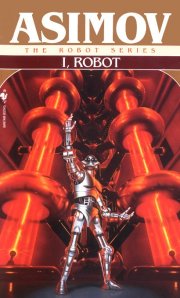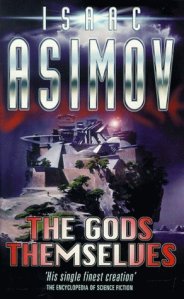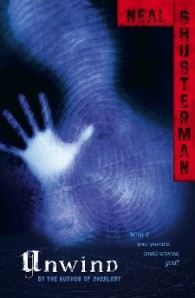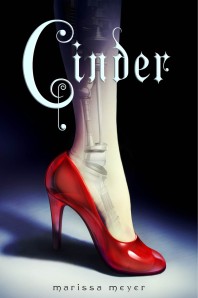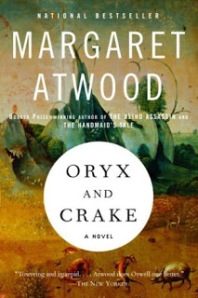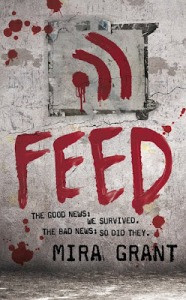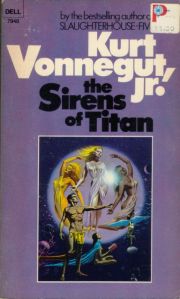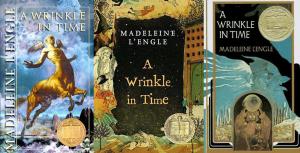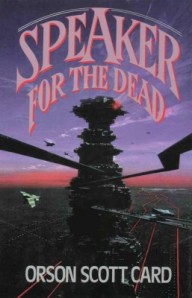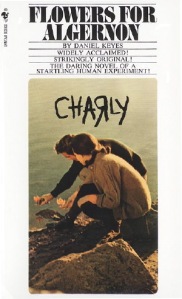This week’s Top Ten Tuesdays is all about your favourite genre! Now despite the fact that my GoodReads account is littered with YA dystopias, my favourite genre is the broader category of sci-fi and speculative fiction. I’ve always loved this genre because it has the ability to ask really hard questions about human development, and it explores a lot of what ifs that have great potential to shape the way we live now. So onwards to my favourite books in this area! (Thanks to the Broke and the Bookish for hosting).
1. I, Robot – Isaac Asimov
I cannot imagine any top sci-fi list that does not contain at least one entry from Isaac Asimov. He is one of the grandparents of the genre (along with Heinlein and Clarke), and his influence is persuasive even in stories produced today. Asimov is also one of the most prolific authors of all time, and he wrote over 500 books before his death.
Admittedly, he’s not a perfect author. He has a very particular style that many readers are not fond of as it is heavy on dialogue and low on action. Additionally, as he was writing many of his biggest novels in the 1940s (and even earlier in some cases!), some of the science is woefully out of date. His female characters are almost non-existent, and when they are there, often poorly characterised. There are also a heap of inconsistencies in his work, though this is pretty understandable for a man who wrote an overarching series over a period of fifty years. And despite all his flaws, I adore him.
If I had to choose my favourite of his books, it would have to be I, Robot. This is a collection of short stories that really kicks off the robot universe in Asimov’s work. As I said earlier, Asimov is still influential today, and one of his most commonly used ideas is the three laws of robotics. When he was first writing sci-fi stories, Asimov was often frustrated at the evil robot plot that was so prevalent, so he started to think about a set of rules that could be used to ensure that robots were safe tools to be used by humanity. Thus, the three laws were born that ensured that all robots were programed to be unable to harm humans. However, once he created these rules, he decided to play with them, and I, Robot is all about how the rules aren’t as easily applied as one might think. It’s a great read for experiencing some of the best of the golden age of sci-fi.
(PS: I refuse to acknowledge that the movie exists. If you have seen it, wipe it from your mind! The only things similar in it to the book are some of the names, and the idea that the three laws can be fickle. But at least Asimov respects his own rules when he plays with them).
2. The Gods Themselves – Isaac Asimov
I promised myself that I was only allowed to list, at most, two Asimov novels. This was an extremely challenging task since Asimov, as mentioned, was an extremely prolific author. However, with considerable thought, I have managed to narrow my nominees down to two: the aforementioned I, Robot, and The Gods Themselves.
The Gods Themselves was Asimov’s attempt to write about two things that critics were always pointing out that he avoided: sex and aliens. Asimov’s take on these two subjects is very strange, unique, and definitely interesting to read about! I don’t want to say much about how he conceptualised these two things because it is definitely a book that works best if you go in with no spoilers. The Gods Themselves will keep readers guessing as it uses viewpoint switches to good effect, it is fascinatingly different from Asimov’s other work, and it’s just a great alien book overall.
3. Unwind – Neil Shusterman
I may have only read Unwind recently, but I am sure that this series will remain stuck in my brain for many years to come. In short, this is a terrifying, haunting book that brings extraordinary difficult questions to the minds of young adult readers. After all, in Unwind, it is legal to have a teenager separated into parts (unwound) for organ transplants and the like. Near the end of the book, Shusterman writes a first person perspective of being unwound. I felt like my heart was going to stop. It was one of the most chilling scenes I’ve ever read in YA literature, and the memories of that piece of writing still make me shudder when I think about them.
My one criticism about Unwind was that I thought the political aspects of the world building did not make sense. I could not begin to fathom how a pro-choice/pro-life war could possibly result in the terrible realities of the Unwind universe. However, this world building was slowly developed throughout the next few books, and I no longer feel so incredulous. In fact, I was quite impressed with the layering of actions and consequences that went into the creation of this dystopic world.
4. Cinder (Lunar Chronicles) – Marissa Meyer
Cinder is, unsurprisingly, a fairy tale retelling of Cinderella, but one that makes great use of its sci-fi setting. It wins a place on this list not only because it’s a great story, but because YA sci-fi that actually makes use of the genre properly is not all that easy to find. Too many stories have science and technology issues present in the plot, but they are actually superfluous to the story. To explain this, I’ll use one of my favourite examples of YA fiction gone wrong: The Selection.
When I talk about The Selection, I usually harp on its political or social issues that are unexplained or incompletely thought out. Today, however, I’m going to deconstruct its technological aspects. The Selection is a speculative dystopia that occurs in the future after several major wars have changed society greatly, and one of these changes is that technology has regressed exponentially save for things like televisions. The story as it is written requires that citizens have televisions in their homes so that they can watch the selection; however, the rest of the story tries to divorce itself from technology as much as possible without much explanation. This type of world building could be fascinating in a sci-fi story, but it fails because the story actually has little to do with this feature. The Selection feels more like a piece of alternative historical fiction save for the presence of the television show. In fact, it could have been just as easily written as a fantasy where the show was a result of some sort of magical viewer instead of a TV. The book could have easily been slotted into any of these genres had it bothered to really explore the consequences of this choice. However, it chose to be a piece of speculative fiction with sci-fi elements that weren’t explored, didn’t make sense, and certainly weren’t all that central to the plot overall. This is a common mistake with genre fiction, particularly sci-fi, and one that causes me a particularly large amount of annoyance.
Cinder, on the other hand, requires its sci-fi setting to work. The story of Cinderella gave Meyer the setup of a family with a mother who has two blood related daughters, and one daughter who was only connected to the now deceased husband. However, in Cinder, the title character is treated poorly because she is a cyborg, not just because she’s an adopted daughter. Cyborgs are treated as inferior because of humanity’s fear of becoming obsolete. This fear has been exaggerated by the presence of Lunars, an evolved form of humans who now have the ability to control regular humans with their minds. Furthermore, humanity is in a state of panic over a plague that turns out to be part of a campaign of biological warfare. Cyborgs are used as test subjects because one doctor was looking for the lost Lunar princess, but also because they were easy social scapegoats given the average citizen’s fear of them. Thus, Cinder is a story where the genre elements are embedded in the plot, and without these pieces, the story would be changed dramatically.
Cinder is also a great piece for introducing sci-fi to the YA genre in a way that is not overwhelming as the science is structured in a way that is understandable to the age group that it is targeting. Further, it contains popular elements such as romance, and also engages with some of the big questions explored in sci-fi, such as what it means to be human. Overall, Cinder is a fantastic book that really deserves more attention as a great piece of sci-fi literature.
5. Oryx and Crake – Margaret Atwood
Oryx and Crake is a chilling look at what society could become if we continue to stress individualism and hyper-capitalism as our primary collective goals. Told through the eyes of an unlikeable protagonist who is not a scientist, Atwood creates a fascinating futuristic world with a focus on a lot of the little details that makes the story come to life (rakunks! Chickie nubs!). This is another book I’ve discussed quite a few times, so I will keep this short and just say that Atwood wrote a sci-fi masterpiece with this book!
6. Feed – Mira Grant
A clerk at a local bookstore pushed me to buy Feed, and I remain forever grateful. Feed is everything I want in sci-fi. It has science that makes sense, one of the protagonists is an interesting and complex female character who isn’t perfect or a blank stale, there are scary zombies, there is political and social commentary, the characters are sarcastic and witty, and the world-building is thoughtful and complete. I’ve gushed about this book a lot on my blog, so I will end by just stating that this book (and its sequels) are amazing pieces of modern sci-fi, and everyone should read them!
7. The Sirens of Titan – Kurt Vonnegut Jr.
The Sirens of Titan was my introduction to the world of adult sci-fi, and it pretty much blew my little teenage mind. The major themes of the book touch on issues such as free will, and the point of human existence. The book can be quite dark, but it is also a black comedy so there is levity as well. What still stands out about it to me today is that some of the scenes are unbelievably creative and strange. For example, the alien creatures on Mercury who eat sound represent such an innovative way of looking at non-human life, and this ability to look beyond the typical is a staple of great sci-fi.
8. A Wrinkle in Time – Madeleine L’Engle
A reader’s love for sci-fi and speculative fiction has to start somewhere, and I am pretty sure my introduction to the genre was through L’Engle’s books. A Wrinkle in Time is a children’s book that talks about hard scientific concepts while also discussing the concept of evil. It treats its readers with respect, not shying away from difficult concepts, but trying to present them in a way that younger readers can understand. Another plus is that the protagonist is a young, imperfect girl. She’s not a super model in denial, she’s not overly exceptional at any one thing (except for math, a most definitely under-appreciated talent!), and she acts out and whines like a kid should. Meg is also brave, independent, and loyal. It’s a delight to read about a female protagonist who feels like she could be a real person. Even when the sci-fi setting of the story throws her into unimaginable situations, Meg manages to keep going. Another plus about A Wrinkle in Time is that the sci-fi aspects of the story are very memorable. From the strange beings that Meg and her family become entwined with, to the concept of tesseracting, it’s hard to forget these neat ideas, and they probably inspire kids to explore fields like physics and math.
9. Speaker for the Dead – Orson Scott Card
I really didn’t want to put Card on my list because my personal feelings for him and his work have soured so badly to the point that I struggle to enjoy even the works of his that I once loved. However, Speaker for the Dead is an outstanding sci-fi novel. Speaker is a sequel to the famous Ender’s Game, but the story is much more expansive. Instead of being about a group of kids on a space station, Speaker takes place in a universe where humans have gone exploring and now live on many different planets. This book also introduces a new form of alien who, like most of the aliens on this list, are a very different life form in comparison to humanity. The life cycles of these creatures are an important plot element of the book as much of the story deals with how two sentient species should deal with one another. Add in the remaining Hive Queen, Jane (a being made out of what is essentially the universal internet), and another surprise alien species, and you’ve got quite the batch of ethical considerations to deal with. Speaker takes very few shortcuts with its world building, and sci-fi fans will find their imagination happily pushed in this very philosophical, but also thrilling story.
Though, in forewarning, I find that Card’s personal political views start to come out a bit stronger with each book he writes, so this one has a bit more blatant moralising than Ender’s Game (though in retrospect, Ender’s Game has some pretty blatant issues as well).
10. Flowers for Algernon – Daniel Keyes
If I had to name my favourite book of all time, Flowers for Algernon might actually be it. I’ve re-read it at least ten times, and the story never fails to make me all contemplative and weepy. The sci-fi plot deals with an intellectually impaired man who undergoes an operation that is supposed to increase his intelligence. Like all good sci-fi, this brings up hard questions about ethics and humanity that have no easy answers. The author also says some rather cutting things about how mentally disabled people are treated by society as a way to challenge us all to be better.
What really stands out in this book is the fact that it is narrated from Charlie’s perspective, and Charlie changes dramatically throughout the book. At the beginning of the novel, Charlie is a 32 year old man with an IQ of 68. His literacy and comprehension levels are low, and the journal entries reflect these realities. His sentences are short, his spelling not so great, and many of his observations are child-like. He works at a bakery, and aspires so badly to become smart so that people are not frustrated with him. Thus, when he is offered the opportunity to take part in a controversial experiment that would alter his brain in order to try and increase his intelligence level, he jumps at the chance. Cue a lot of heart wrenching on my part since Charlie does this because he wants so badly to be liked and respected as an equal human being.
After the operation, Charlie does slowly start to become more intelligent. He is enrolled in an assortment of lessons, and his journal entries become more and more sophisticated. In fact, Charlie essentially gains a genius level IQ, and outstrips most of his teachers, and even the scientists who design the experiment. However, with increased intelligence comes backlash from those around him, and Charlie comes to the realisation that those he cared about most were actually very cruel. Additionally, while his intellectual abilities increased substantially in a short amount of time, his emotional maturity did not grow at the same level, so Charlie struggles mightily with how to deal with a bevy of emotions that he has never experienced before.
Flowers for Algernon is a devastating book. Reading it is basically the same as asking someone to punch you in the guts over and over again. But unlike getting randomly punched in the guts by a random person, this story leaves readers with some really important thoughts that are way more beneficial than internal bleeding. You will be taken to the absolute emotional heights of hope and love, and to the deep depths of rage and despondency. You will probably finish without an answer to all the challenging conflicts and ideas presented by Keyes, but you will have a better appreciation for the spectrum of humanity. If there was one book on this list that I could make everyone read, Flowers for Algernon would be it because it is a phenomenal piece of literature, and a great example of just how extraordinary science fiction can be.

